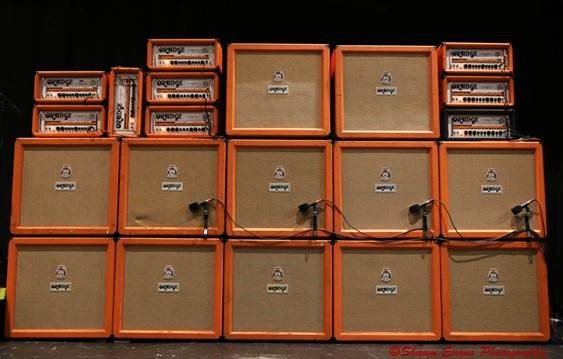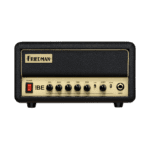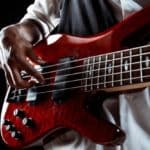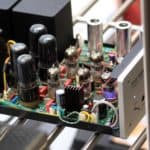Many players will argue that higher watt amps are better, however, over the last decade, the industry shifted towards lower power units.
It’s true that demand does not always follow quality, and perhaps price and usability is a stronger deciding factor for a lot of people, but that’s not our topic today.
Higher watt amps are objectively better than their smaller siblings in a series of factors. I will talk more in-depth about this in this article.
If you want a short answer about this topic, here it is:
High-watt amps will output more volume, although not linearly with their wattage, have more controls and options, and give you more headroom for your clean tones to stay clean. On the other side, they will usually be more expensive, a lot bigger, and sound worse when played at lower volumes.
In this post, I will focus on answering the most common questions about what makes a higher watt amp better.
I will talk about the pros and cons of louder, bigger units, and give you my insights into if a high watt amp is the correct choice for you.
After reading this article you will have a clear idea of what, in my opinion, makes a louder amp better.
Are you ready to get started?
Let’s go.
Are higher watt amps louder?
High watt amps are of course louder, however, that increment in loudness is not linear. A 100-watt amp is not twice as loud as a 50-watt one. Those 50 extra watts will result in a 3 dBs louder experience through the same speakers. Noticeable but not deafening. To get twice the loudness you would need 5x watts.
Not that you would ever need a 500-watt guitar amp to gig with. 100 watts are the industry standard, and it’s not that common to see more powerful ones.
At that point, the benefits that the extra wattage could get you in loudness are enough to play live on small and even medium venues. For larger places, you will surely mic your amp and go through the house speakers.
Hey, maybe you get to go through the PA system in smaller venues. The trend is moving towards less noisy stages anyway.
What makes an amp louder?
There are many factors that could affect the actual loudness of an amp. Of course, the power output is one of the most important ones. Factors like how compressed is this output, what kind of power stage the amp has, and the kind of speakers that it’s going through are other defining features.
I will go into more detail about each of these characteristics that define the loudness of an amp:
Compression
Compression, overall, is a slightly complicated concept to grasp. I tend to have to stop for a second and think about how it actually works sometimes.
But to make things simple, when you compress audio, you are cutting the volume peaks in it. The result is a less dynamic, or a more tight sound with the loudest peaks being nearer to the quietest parts.
This is particularly useful when you want to crank the volume up. Think about it, if you have a high variance in your loudness, you will need to use a volume level such that your louder peaks don’t destroy any listener’s ears. Although the quiet parts of the song will now be louder, their volume might still be not enough.
You solve that last ordeal with compression, however, the drawback is that as you go harder on it, you will lose dynamics.
All of this is to say that amps that compress your signal the most will enable you to crank them louder than those that don’t.
Tube amps are particularly known for delivering more compressed sounds.
Solid-state vs tube amps
There’s a big argument and rivalry about these 2 kinds of power sections for amps.
The thing, relative to our topic, is that tube amps are louder in almost any case I can imagine.
A 50w solid-state amp will sound about as loud as a 15w tube-powered one. This is because of the resistance that the speakers exert over the signal your amp uses to push them. Impedance is the technical word for this concept. A solid-state amp will send the speakers a hard-clipped range of frequencies that would reduce their available power.
Tube amps are more efficient at delivering their power and sound louder.
Also, some might say that because solid-state amps sound harsher you would choose to not set them to volumes as high as warmer-sounding tube counterparts. However, this might be biased against solid-state lovers.
Speakers
Speakers have a strong influence on the loudness of an amp. Their quantity, size, and impedance are big defining factors of the volume you will get when coupled to your head or combo unit.
Efficiency in delivering power is another thing to consider when talking about speakers, the rule of thumb is as you go higher in quality, the louder a speaker will be.
Quantity of speakers in a cab, of course, means the ability to push more air, and so does their size. However, different size speakers will make some frequencies “shine” more than others, that’s why bigger speakers have a better bass response, and smaller ones are used for high frequencies.
Impedance is the resistance the speaker has against the power going through it. Another easy rule of thumb here is that the better you match your amp’s impedance output with the speaker’s input, the louder you will sound.
What are the pros of a higher watt amp?
It’s time now to get down to the specifics, in my opinion, the main benefits of a high-watt amp are the following:
Loudness
An obvious one, and as I discussed earlier, more watts means louder, although the relationship between watts and loudness is not linear.
In many use cases, such as gigging, a small amp will not cut it. You will have to take out the big guns if you want to be heard over a drum kit or in a medium or larger venue.
Options and controls
More powerful amps are bigger and more expensive. This means that players who pay this premium get extra perks.
The majority of higher-watt amps have more controls and options than their smaller versions, and this is the industry standard.
If you are a tweaker by nature, then you might have to consider something louder.
Headroom
Last but not least, and perhaps the main reason to pick up a high-watt amp is the headroom it will give you.
To be more specific, the smaller the amp, the harder it would be to keep it sounding with a clean tone at high volumes.
Amps have a breaking point when they start distorting, and this is not a bad thing. Many players love this sound, and this is the way originally distortion was achieved.
However, if you want to play clean and be loud, the only option you have is to get more watts.
What are the cons of a higher watt amp?
Clearly, such beasts have their drawbacks. Although they are completely subjective and many might not worry you in particular.
Here are what I consider the main cons of a high watt amp:
More expensive
As I mentioned earlier, you pay for the extra power. This premium will usually come with more options and controls, but the cost might not cut it for you.
Lots of players prefer simpler and cheaper amps that would sound just about the same, but quieter.
Bigger and bulkier
When talking about tube amps, in almost every case, more watts mean bigger units. In the solid-state realm, this is not always true, however.
If you have enough space this would not be a problem, but if you are a bedroom player, a high-watt amp would not only be inconvenient, but unplayable.
They require volume to sound good
Many will argue against this one, but it’s a general claim, keep it civil.
A high-watt amp will lose detail and have a different response at lower volumes. Of course, you can always use the master volume to keep things quiet, but you will never achieve the power stage saturation that many look for by doing so.
To overcome this problem, there are amp attenuators that let you set your amp to 11 and send the signal through them. They then give you the option to control the output volume.
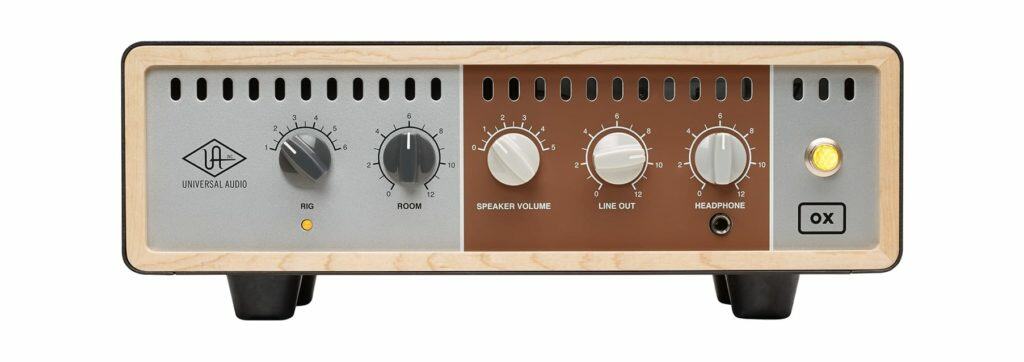
This is not the same as controlling volume with the master of the amp. With an attenuator, your amp will be running at full power and having its power section cranked and saturating.
Do amps sound better at high volumes?
In many cases, amps sound better at higher volumes, especially when you’re looking for slightly overdriven sounds or the tones resulting from the breakup produced by their power section saturating. For clean tones, volume is not a very decisive factor for tone, as long as the amp is below its breaking point.
As I mentioned earlier, attenuators are great options to get that sweet saturated sound at lower volumes, but they come at a cost.
Do high-watt amps sound bad at low volumes?
High-watt amps don’t sound bad at low volumes, but they might lose detail and respond in a different manner. Their compression might not be the same, and you won’t ever get any power stage saturation, a very important part of the overdriven tube amp tone. Clean tones will not be affected too much, however.
If you are planning on playing most of the time at low volumes, I think a high-watt amp might not be for you. There are very interesting smaller options suited for bedroom and low volume playing that will let you achieve amazing tube sounds.
Do more watts mean more bass?
More watts don’t mean exclusively more bass, the frequency spectrum will be louder all around. However, usually, high-watt amps are used with bigger cabinets with more speakers that arguably will have a better low response. Being this said, low frequencies require more power to be perceived as loud as others.
Why do bass amps need more wattage?
Bass amps need more power because lower frequencies require it to sound as loud as the ones in other ranges. Bass amps are also usually paired with larger speakers. Headroom is also an important aspect for the players since bass sounds are usually desired to sound extra clean.
All these factors combined result in the majority of bass amp having a lot more watts than guitar amps that sound as loud. This is because also solid-state power sections are more common among bass players since they deliver very high outputs with small form factors.
The perception of bass frequencies at lower volumes is a human thing. We evolved to be more aware of mid and high frequencies since they were a sign of danger for our prehistoric ancestors.
How many watts are enough to gig with?
If you don’t mind a distorted tone, 30 watts will be enough to gig with a drummer in small/medium venues. If you want to keep the cleans clean, I’d say you will need between 60 and 100 watts. However, most medium or larger venues nowadays will likely mic your amp and have you use it at lower volumes.
These numbers are for tube amps, for solid-state powered ones, you might have to go a bit higher since they are not as loud.
How loud is a 100-watt amp?
The loudness of a 100-watt amp will have to do with many factors such as the speakers it’s running through and their sensitivity. An estimate would be around 125 dB when cranked. This is louder than a chainsaw, and around the loudness of a jet plane taking off.
A 100-watt amp will cause you permanent hearing damage if you set it to its max volume in a small room, so be extra careful.
Always increase volume slowly and start from the lowest possible setting to avoid accidents.
Remember that almost all modern high-watt amps have a master volume knob that will allow you to use them at bearable levels.
Is a 100-watt amp too loud for home?
A 100-watt amp would almost certainly be too loud for home use, especially if you want to have its power stage saturating. At that volume, it could cause you hearing damage. If you intend to play clean or stay away from its breakup, most amps have a master volume that would allow you to play at lower levels.
You could always get an attenuator to enjoy that sweet power stage saturation at lower volumes, or go for a smaller amp that will allow you to crank it and not have your ears blown up.

Hello there, my name is Ramiro and I’ve been playing guitar for almost 20 years. I’m obsessed with everything gear-related and I thought it might be worth sharing it. From guitars, pedals, amps, and synths to studio gear and production tips, I hope you find what I post here useful, and I’ll try my best to keep it entertaining also.

